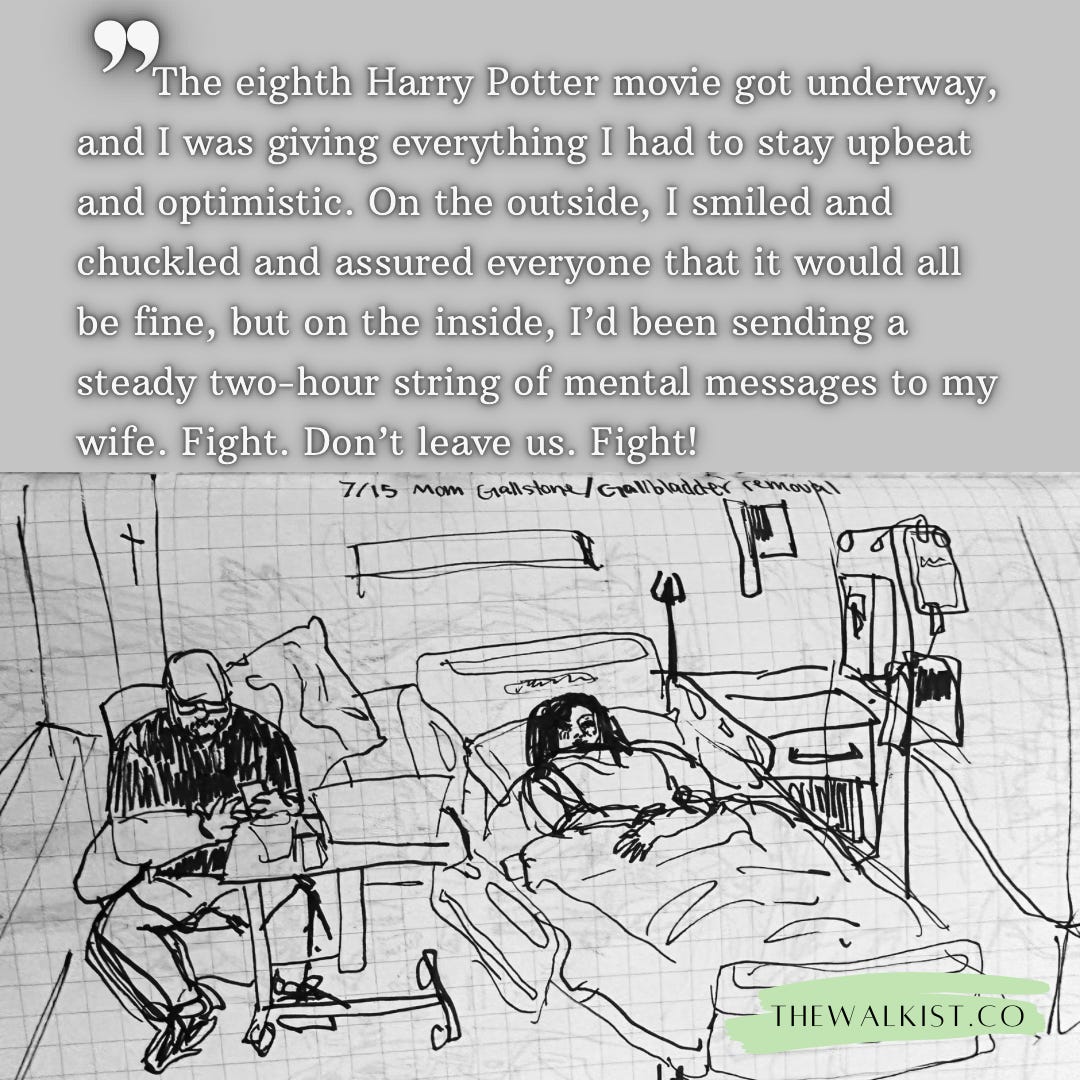
This past weekend was draining – at times a blur, at times a trudge. My wife Juanita had been dealing with gallstones for more than five years. Last week, she had a flare-up that required her gallbladder be removed.
Most of her flare-ups through the years self-corrected after about 18 to 24 hours. This one was going on 48 before she agreed to go to the nearby urgent care center to have it checked out Friday evening.
I could tell the pain was getting to her when I found salt, eggshells, and a book of curandera remedies in the bathroom. This woman’s tolerance for pain is other-worldly – some days, to her own detriment. That she was seeking relief told me the flare-up had become excruciating.
Rewind 20 years and her father was suffering his own gallstones. Gallstones that caused internal infections and took the beautiful man from his family much, much too soon. They lost him about a year before Juanita and I met, and he still looms large in her family’s consciousness.
To say the memory of her father’s battle with gallstones was on her mind while at urgent care would be an understatement. But there, too, she didn’t say anything. Two decades at her side has removed the need for her to verbally acknowledge these things.
So I verbalized it, assuring her that everything would go smoothly.
She cried. Not much, but she cried.
Acknowledging that it was on her mind allowed her to release the feelings of fear that the past would repeat itself. Her body loosened up, and her mood elevated. The tension in the room began to melt.
Fast forward to noon on Saturday. We’d been transferred to a hospital for the surgery, and she was being taken to pre-op for a one o’clock cholecystectomy (I had to look that up). Hospital staff were all just lovely, and very good at their work. They took my cell number so they could text me updates while we were separated.
At around 12:10, I got a call saying that a different emergency had bumped her surgery from 1:00 to 2:30, but she was going to stay down in pre-op instead of coming back up to the room. I was in charge of status updates for everyone – our kids, my side of the family, her side of the family, friends, co-workers. I let everyone know the new schedule, and I got back to trying to pass the time up in the hospital room. One of the TV networks was running a Harry Potter marathon, and I was into movie number six by this point.
I had been told by everyone that the surgery would take somewhere between 30 minutes and an hour-and-a-half. Not a long surgery.
By the time three o’clock rolled around, I was starting to watch my phone for updates, excited to get word that everything went smoothly and that she would soon be rejoining me in Room 504.
Gradually, three o’clock became four.
Finally, my phone buzzed. Family.
Yes, they said it was going to start at 2:30, so I assume it did.
Gruelingly, four o’clock became five.
Another buzz. Family again.
No, I haven’t heard anything yet, but I’ll be sure to let you know as soon as I do.
Desperately, five o’clock became six.
I was almost afraid for my phone to buzz. It did. Family.
Nothing yet. Still in surgery.
The eighth Harry Potter movie got underway, and I was giving everything I had to stay upbeat and optimistic. On the outside, I smiled and chuckled and assured everyone that it would all be fine, but on the inside, I’d been sending a steady two-hour string of mental messages to my wife. Fight. Don’t leave us. Fight! I’d started imagining how to tell our kids the worst. How to tell her mother that the events of 20 years ago had come back to pay her another terrible visit.
At 6:12, my phone buzzed yet again. This time it was the hospital. I took a deep breath and began to read.
Your loved one is off to sleep and the procedure has started.
Wait, what?!
While everyone who loves her had been waiting, worrying, wringing their hands, she’d been waiting, bored, twiddling her thumbs through the pain, wondering when her operation would even begin? I thought she’d been under the knife three-times as long as it should take, but it’d just been delayed this whole time?
What one little message could have done for everyone’s sanity that afternoon.
She’s been bumped again. The procedure should start around 6:00.
Oh, the message that never was.
I quickly and happily spread the news along with apologies for not having better information until now. I played it off as if I were never worried.
By 6:58, I got a call from the surgeon that it all went smoothly and that she was in the recovery room, waking up. She was back in Room 504 with me in time to watch Harry’s final face-off with Lord Voldemort. Her voice was strong again, and her eyes were bright. We shared laughs about the update that never happened. We called her family and shared love and joy. The world was as it should be.
Sunday, we got home and took a nice long nap. After I got up and got showered, Juanita mentioned that I was taking a lot of big, deep breaths. She asked if I was ok. I said I was. I thought I was.
Yeah, I’m just exhausted and relieved that it’s all finished and we’re back home. Still trying to catch my breath, I guess.
The deep breaths kept happening for the next couple hours. She asked again. This time, I couldn’t answer.
I wept.
Through the tears, I told Juanita everything that had gone through my mind during those hours. I verbally acknowledged it all. I let it all go. And it felt magnificent.
Later, I did some reading to get a better understanding of that magnificent feeling. I remembered my mother once telling me during a difficult time that she felt as though she needed a chance to have a good cry. I knew that it could be emotionally cathartic, but I didn’t realize the physiological boost that a good old-fashioned snot-sob session could have.
It turns out that when you allow yourself to release built up emotion in the form of a good cry, it does a number of things beyond emotional release. Chemical analysis has shown that the tears themselves leech and flush out some of the built-up stress hormones in your body. The act of crying also triggers the production of oxytocin – also known as the love hormone. It creates a euphoric feeling, and if you have someone’s shoulder to cry on, it strengthens the emotional bond between the two of you. Crying also activates the parasympathetic nervous system which is in charge of helping the body relax.
Let’s dig into that a bit more. If there is a parasympathetic nervous system, is there a sympathetic nervous system? Yes, there is! They are one another’s yin and yang. In times of stress, the sympathetic nervous system is activated, putting the body’s functions on high alert. It’s what’s in charge of our fight or flight response. When the moment of stress has passed, it’s the parasympathetic nervous system’s job to bring those functions back to idle, to relax everything. Sometimes, the parasympathetic nervous system needs help getting going. Crying does just that. It’s a quirk that makes us uniquely human.
In his book Why Zebras Don’t Get Ulcers, Neurobiologist Dr. Robert Sapolsky explains that wild animals endure stress episodically (e.g., being chased by a lion) while humans often face chronic stress (e.g., worrying about bills, work, or health problems). Animals have a more automatic completion to the stress cycle (escape the lion and the stress response cycle closes automatically), while humans often need something more akin to psychological or emotional closure to trigger a closing of the stress cycle, such as a good cry (and in my opinion, being able to verbally acknowledge the things you’re holding on to). Words are powerful. Tears are powerful.
For the academic in me, learning the why and how of it all was fascinating. For the husband, father, and simple human in me, the magnificent feeling was enough.
Juanita is recovering very nicely, by the way. If you want to show her some love, post in the comments. I’ll make sure she sees all of them.






Good afternoon señor,
My name is Antonio and I have personally worked with Juanita for 6 years, 3 of them being part of our team and even taught your daughter last year! As a husband as well, I wouldn’t have known what to do with all of that waiting I would have gone crazy!
Juanita is a free spirit, someone who makes you laugh all of the time, and makes sure that everyone is taken care off. I’m glad you were there for them. I’m also glad that she be coming to work again!
Awesome perspective!!
My husband died in March after a long illness. I was his one and only caregiver. I loved him deeply and miss him every day but I’ve not once been able to cry. Is it the Lexapro like they say? What’s up with that?